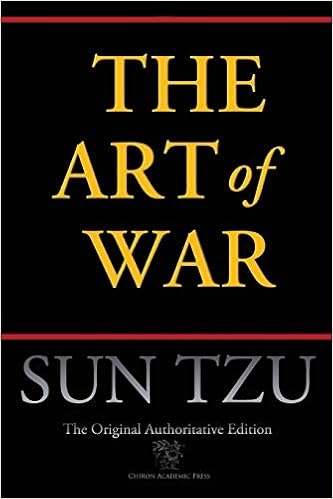
The Art of War by Sun Tzu
The Art of War is an ancient Chinese military treatise attributed to Sun Tzu, a high-ranking military general, strategist and tactician, and kindred to the Realpolitik of his time, termed in China as Legalism.
The text is composed of 13 chapters, each of which is devoted to one aspect of warfare. It is commonly thought of as a definitive work on military strategy and tactics.
It has been the most famous and influential of China’s Seven Military Classics, and “for the last two thousand years it remained the most important military treatise in Asia, where even the common people knew it by name.”
It has had an influence on Eastern and Western military thinking, business tactics, legal strategy and beyond.
Quotes
- Appear weak when you are strong, and strong when you are weak.
- If he is superior in strength, evade him.
- Attack him where he is unprepared. Appear where you are not expected.
- The general who loses a battle makes but few calculations beforehand.
- There is no instance of a country having benefitted from prolonged warfare.
- Supreme excellence consists in breaking the enemy’s resistance without fighting.
- If you know the enemy and know yourself, you need not fear the result of a hundred battles. If you know yourself, but not the enemy, for every victory gained you will also suffer a defeat. If you know neither the enemy nor yourself, you will succumb in every battle.
- One may know how to conquer without being able to do it.
- In war, the victorious strategist only seeks battle after the victory has been won.
- In battle, there are not more than two methods of attack: the direct and indirect.
- An army may march great distances without distress if it marches through country where the enemy is not.
- You can be sure in succeeding in your attacks if you only attack places which are undefended.
- Military tactics are like water. For water, in its natural course, runs away from high places and hastens downwards. So, in war, the way is to avoid what is strong and strike at what is weak.
- Let your plans be dark and impenetrable as night, and when you move fall like a thunderbolt.
- Ponder and deliberate before you make a move.
- A clever general, therefore, avoids an army when its spirit is keen, but attacks it when it is sluggish and inclined to return.
- It is a military axiom not to advance uphill against the enemy nor to oppose him when he comes downhill.
- The art of war teaches us to rely not on the likelihood of the enemy not coming, but on our readiness to receive him.
- Make your way by unexpected routes and attack unguarded spots.
- If they will face death, there is nothing they will not achieve.
- The principle on which to manage an army is to set up one standard of courage which all must reach.
- If it is to your advantage, make a forward move. If not, stay where you are.